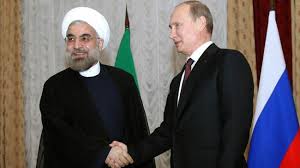ID :
354679
Tue, 01/20/2015 - 14:45
Auther :
Shortlink :
https://oananews.org//node/354679
The shortlink copeid
Iran-Russia opt for security, strategic cooperation

Tehran, Jan 20, IRNA -- The current visit by Russian Defense Minister Sergey Shoigu to Iran is an opportunity to examine Tehran-Moscow strategic cooperation and their extensive efforts to create stability and security in the region.
Iran and Russia are two influential and major countries in the region with relatively similar approaches towards many key international issues.
Topics such as Russia’s confrontation with the West, Iran’s nuclear talks, deployment of missile defense shields to Eastern Europe, Syria, regional security crisis, Daesh terrorist group, energy and gas, and Russia-Europe future relations are among subjects that underline common interests in Tehran-Moscow relations.
However, the Russian policy towards the Ukrainian issue is a development that may benefit Iran as the best source to replace Russian energy supply for the Western Europe. That is very likely if the US-led international sanctions against Iran are lifted or eased in future.
A point of convergence between Iran and Russia is that both countries support President Bashar Assad of Syria. Tehran supports Assad with every means while Russia has repeatedly vetoed UN Security Council resolutions against Damascus and has stopped efforts by international forces to attack Syria.
Under such conditions, visits between Iranian and Russian senior authorities as supporters of the Syrian and Iraqi people are of significance, as the West’s miscalculations or pre-orchestrated schemes would eventually damage the regional security.
Mutual strategic collaboration
Since long past, Iran-Russia relations have been interwoven, though they have suffered tension periodically due to certain issues such as Russia’s failure to deliver S-300 missile system to Tehran. However, bilateral ties have increasingly progressed during the past several years in the wake of diverse regional and international developments. The two countries, as two potential partners, have adopted relatively similar stands in face of various world issues.
In their bilateral talks on numerous occasions, the two countries have paid attention to further strategize Iran-Russia relations and establish long-term and sustainable ties based on mutual interests, a development that can lead to security, stability and viability of the region and peace and friendship in future.
Under the government of Hassan Rowhani, Tehran and Moscow have increased the volume of bilateral exchanges and signed new long-term contracts in various fields of trade, energy, and nuclear technology.
However, Russia's unilateral abrogation of an agreement to deliver S-300 missile system has led Iran to lodge a lawsuit as Tehran believes the system has a defensive nature and is not covered by the UN sanctions resolutions against Iran.
Despite this and with due respect to regional developments, the two countries believe their national interests are complementary to each other.
That is why not only the presidents and foreign ministers of the two countries but also their defense and military authorities have exchanged visits during the past two years within the framework of security interests.
Invited by his Russian counterpart, Iran’s Defense Minister Hossein Dehghan, attended a Moscow Conference on International Security 2014, where he outlined Iran’s defensive doctrine on terrorism, weapons of mass destruction, and other international issues. He also invited his host to pay a visit to Tehran. The Russian minister arrived here Monday night.
It should be noted that Iran and Russia are two significant and influential countries with common interests in many international fields and that can overcome their problems through mutual collaboration.
As the West opposes Iran over its peaceful nuclear program and Russia in the international politics, it seems imperative for the two countries to increase their bilateral exchanges. The exchange of visits by Iranian and Russian officials can be assessed within this framework. The current visit by Sergey Shoigu to Tehran will be an opportunity to better evaluate fields of closer and more consolidated bilateral cooperation with an aim to provide stability and security in the region. Talks on bilateral military exchanges could be of special importance, too.
Therefore, minor issues should not leave a negative impact on Tehran-Moscow relations while the two neighboring countries face common enemies and threats. That is why such visits and talks should result in a win-win situation and the interests of both Iran and Russia and of the region be materialized.





